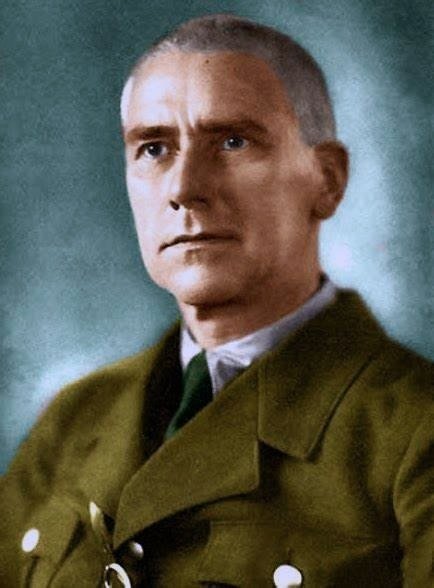Wilhelm Frick
Wilhelm Frick (12 March 1877 – 16 October 1946) was a prominent German politician of the Nazi Party, who served as Minister of the Interior in Adolf Hitler's cabinet from 1933 to 1943 and as the last governor of the Protectorate of Bohemia and Moravia.
As the head of the Kriminalpolizei (criminal police) in Munich, Frick took part in Hitler's failed Beer Hall Putsch of 1923, for which he was convicted of high treason. He managed to avoid imprisonment and soon afterwards became a leading figure of the Nazi Party (NSDAP) in the Reichstag. After Hitler became Chancellor of Germany in 1933, Frick joined the new government and was named Minister of the Interior.
Early life
Born in the Palatinate municipality of Alsenz, then part of the Kingdom of Bavaria, Germany, the last of four children of Protestant teacher Wilhelm Frick sen. (d. 1918) and his wife Henriette (née Schmidt). He attended the gymnasium in Kaiserslautern, passing his Abitur exams in 1896. He went on studying philology at the University of Munich, but soon after turned to study law at Heidelberg and Humboldt University of Berlin from 1900, he joined the Bavarian civil service in 1903, working as an attorney at the Munich Police Department. He was appointed a Bezirksamtassessor in Pirmasens in 1907 and became acting district executive in 1914. Rejected as unfit, Frick did not serve in World War I. He was promoted to the official rank of a Regierungsassessor and, at his own request, re-assumed his post at the Munich Police Department in 1917.
In Munich, Frick witnessed the end of the war and the German Revolution of 1918–1919. He sympathized with right-wing Freikorps paramilitary units. Chief of Police Ernst Pöhner introduced him to Adolf Hitler, whom he helped willingly with obtaining permission to hold political rallies and demonstrations.
Frick (3rd from left) among the defendants in the Munich Beer Hall Putsch trial, 1924. Adolf Hitler is 4th from the right.
In the aftermath of the putsch, Wilhelm Frick was elected a member of the German Reichstag parliament in the federal election of May 1924. He had been nominated by the National Socialist Freedom Movement, an electoral list of the far-right German Völkisch Freedom Party and then banned Nazi Party. On 1 September 1925, Frick joined the re-established Nazi Party. On 20 May 1928, he was one of the first 12 deputies elected to the Reichstag as Nazi Party members. He associated himself with the radical Gregor Strasser; making his name by aggressive anti-democratic and antisemitic Reichstag speeches, he climbed to the post of the Nazi parliamentary group leader (Fraktionsführer) in 1928. He would continue to be elected to the Reichstag in every subsequent election in the Weimar and Nazi regimes.
Something wicked this way comes
Frick's power dramatically increased as a result of the Reichstag Fire Decree and the Enabling Act of 1933. The provision of the Reichstag Fire Decree giving the cabinet the power to take over state governments on its own authority was actually his idea; he saw the fire as a chance to increase his power and begin the process of Nazifying the country. He was responsible for drafting many of the Gleichschaltung laws that consolidated the Nazi regime. Within two weeks of the Enabling Act's passage, Frick helped draft the "Second Law on the Coordination of the States with the Reich" (7 April 1933) appointing Reichsstatthalter (Reich Governors) to take over the state governments. He also initiated and drafted the Law Against the Formation of Parties (14 July 1933) that formally made the NSDAP the only legal party in Germany. Under the 30 January 1934 "Law on the Reconstruction of the Reich", which converted Germany into a highly centralized state, state parliaments were dissolved and the newly implemented Reichsstatthalter were made directly responsible to him. He also drafted the Law on the Abolition of the Reichsrat (14 February 1934) that abolished the upper chamber of the Reich parliament. Frick also was made a member of Hans Frank's Academy for German Law. On 10 October 1933, Hitler appointed him a Reichsleiter, the second highest political rank in the Nazi Party.
Losing Favour
From the mid-to-late 1930s Frick lost favour irreversibly within the Nazi Party after a power struggle involving attempts to resolve the lack of coordination within the Reich government. For example, in 1933 he tried to restrict the widespread use of "protective custody" orders that were used to send people to concentration camps, only to be begged off by Reichsführer-SS Heinrich Himmler. His power was greatly reduced in June 1936 when Hitler named Himmler the Chief of German Police, which effectively united the police with the SS. On paper, Frick was Himmler's immediate superior. In fact, the police were now independent of Frick's control, since the SS was responsible only to Hitler. A long-running power struggle between the two culminated in Frick's being replaced by Himmler as Reichsminister of the Interior in August 1943. However, he remained in the cabinet as a Reichsminister without portfolio. Besides Hitler, he and Lutz Graf Schwerin von Krosigk were the only members of the Third Reich's cabinet to serve continuously from Hitler's appointment as Chancellor until his death.
Frick's replacement as Reichsminister of the Interior did not reduce the growing administrative chaos and infighting between party and state agencies. Frick was then appointed as Protector of Bohemia and Moravia, making him Hitler's personal representative in the Czech lands. Its capital Prague, where Frick used ruthless methods to counter dissent, was one of the last Axis-held cities to fall at the end of World War II in Europe.
Frick was arrested, and was arraigned at the Nuremberg trials, where he was the only defendant besides Rudolf Hess who refused to testify on his own behalf.[19] Frick was convicted of planning, initiating and waging wars of aggression, war crimes and crimes against humanity, and for his role, as Minister of the Interior, in formulating the Enabling Act and the Nuremberg Laws – laws under which people were deported to concentration camps, many of them being murdered there. Frick was also accused of being one of the most senior people responsible for the existence of the concentration camps.
Frick was sentenced to death on 1 October 1946, and was hanged at Nuremberg Prison on 16 October. Of his execution, journalist Joseph Kingsbury-Smith wrote:
The sixth man to leave his prison cell and walk with handcuffed wrists to the death house was 69-year-old Wilhelm Frick. He entered the execution chamber at 2.05 am, six minutes after Rosenberg had been pronounced dead. He seemed the least steady of any so far and stumbled on the thirteenth step of the gallows. His only words were, "Long live eternal Germany", before he was hooded and dropped through the trap.
His body, along with those of the other nine executed men and the corpse of Hermann Göring, was cremated at the Ostfriedhof Cemetery in Munich, and the ashes were scattered in the river Isa.
Frick in his cell, November 1945
Born 12 March 1877
Alsenz, Kingdom of Bavaria, German Empire
Died 16 October 1946 (aged 69)
Nuremberg Prison, Nuremberg, Bavaria.
The corpse of Frick after his execution at Nuremberg, October 1946. Injuries caused from hitting his head on the trap door.
Abusive Crimes of Nazi Politician Wilhelm Frick






